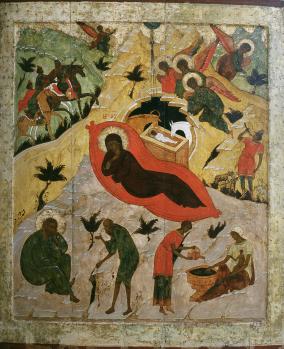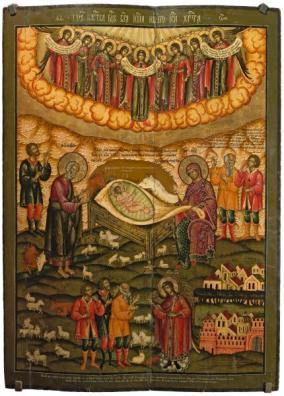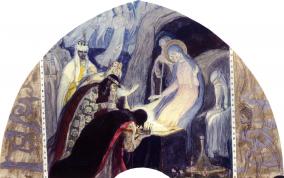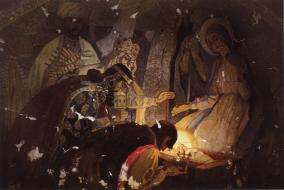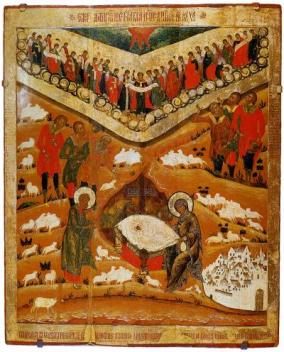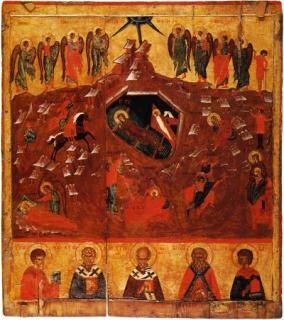Vladimir Nabokov
THE GOSPEL OF IACOV, ch. 18And I saw: the sky was darkened with vaults,
And the clouds interrupted their flight,
And time stopped moving ...
Everything froze.
The rivers were silent water.
Gray fog descended on the shore,
And tilting the horn over the moisture,
The goats did not drink.
Herd on the slopes did not move.
Shepherd, having raised a staff,
Numb with an outstretched handLooking upwards, and over the river
,Above the grove of palm trees, the peaks of the lowered,
Although the air was unrequited and dumb,
The birds hung on the wings of the frozen.
Everything froze.
I waited for Bethlehem ...
And suddenly in the foliage a wonderful murmur awoke,
And a flock of birds ringing rose,
And hooves of hooves sounded,
And water jets,
I heard a whisper,
And the shepherd suddenly heard a song!
And in the distance, dispelling the twilight gray,
As a certain Cross, divinely-light,
The star lit over the flaming cave,
Where at that moment Maria gave birth.1918
Our Lord Jesus Christ, the Savior of the world,
was born from the Blessed Virgin Mary in the reign of Emperor Augustus (Octavius) in the city of Bethlehem. Augustus ordered the nationwide census to be carried out in all of its empire, to which Palestine belonged at the time.
The Jews had a custom of leading people's censuses by tribes, tribes and clans, every tribe and clan had their own specific cities and patriotic places, because the Blessed Virgin and the righteous Joseph, as descended from the lineage of David, were to go to Bethlehem (the city of David) Make their names in the list of subjects of Caesar.
In Bethlehem, they did not find any free space in the city hotels. In the limestone cave intended for the stall among hay and straw scattered for forage and litter to cattle, far from permanent residence, among strangers, on a cold winter night, in an atmosphere devoid of not only earthly grandeur, but even ordinary comfort, a God-man was born , The Savior of the world. "The mystery is a strange sight and glorious," the Holy Church chants with surprise, "the sky is a den; The Throne of the Cherubim - the Virgin; Nursery is a receptacle, in them is also the incompatible Christ God "(irmos of the 9th canon song). Prayerlessly giving birth to the Divine Child, the Blessed Virgin, herself, without outside help, "leads him and put her in creches" (Luke 2).
But among the midnight silence, when all of humanity was embraced by the deepest sinful dream, the news of the Nativity of the Savior of the world was heard by the shepherds who were on guard at night with their flock. The angel of the Lord appeared to them and said: "Do not be afraid: behold, I bring you glad tidings of gladness to you, that all the people will be as you were born today, the Savior, who is Christ the Lord, in the city of David," and the humble pastors were first worshiped for the salvation of people. "Rabiah of the Phantom."
In addition to the angelic gospel to the Bethlehem pastors, the Nativity of Christ was announced by the miraculous star to the Magi of the "starers", and in the person of the Eastern wise men the whole pagan world, invisible to himself, inclined his knees before the true Savior of the world, the God-man. Entering the temple, where the Child was, the Magi - "bowing down bowed down to Him, and opened his treasures, the princesses to Him, gifts: gold and Lebanon and myrrh" (Matthew 2, 11).
In the memory of Christmas in the flesh of our God Jesus Christ, a holiday is established by the Church. Its beginning dates back to the times of the Apostles. The Apostolic Decrees says: "Keep the days of the feast, brethren, and in the first place the day of the Nativity of Christ, which is celebrated by you on the 25th day of the tenth month" (from March). In the same place, in another place it is said: "The Day of the Nativity of Christ is celebrated, and the unchallenged grace is given to men by the birth of God's Word from Mary Virgin to save the world."
In the second century on the day of Christmas Christus on December 25 indicates the saint Clement of Alexandria. In the III century, St. Hippolytus of Rome mentions the holiday of the Nativity of Christ, as it was about the former, appointing the reading of the Gospel on this day from the first chapter of Matthew. It is known that during the persecution of Christians by Maximian, in 302, the Nicomedia Christians were burnt in the temple on the very holiday of the Nativity of Christ in the number of 20,000. In the same century, when the Church after persecution gained freedom of religion and became dominant in the Roman Empire, the Nativity of Christ We find in the whole Ecumenical Church, as can be seen from the teachings of St. Ephraim the Syrian, the saints Basil the Great, Gregory the Theologian, St. Gregory of Nyssa, St. Ambrose, John Chrysostom and other Fathers of the Church of the IV century for the Nativity of Christ. St. John Chrysostom in his speech, which he spoke in 385, calls the holiday of the Nativity of Christ ancient and very ancient.
In the same century, at the place of the cave of Bethlehem, celebrated by the birth of Jesus Christ, the Equal-to-the-Apostles queen Elena built a temple, the splendor of which her great son tried hard to achieve. The code of Theodosius, published in 438, and Justinian - in 535, sets forth the law on the universal celebration of the Nativity of Christ. In this sense, probably, Nicephorus Callistus, a writer of the fourteenth century, in his history says that the Emperor Justinian in the sixth century established the celebration of the Nativity of Christ throughout the earth.
In the fifth century Anatoly, Patriarch of Constantinople, in VII - Sophronius and Andrew of Jerusalem, in VIII - the saints John of Damascus, Cosma Maiumsky and Herman, Patriarch of Constantinople, in IX - the Monk Cassius and others, whose names are unknown, wrote many sacred for the Feast of the Nativity of Christ The hymns used today by the Church for the glorification of a lightly celebrated event.
However, in the first three centuries, when persecution hampered the freedom of Christian worship, in some places in the East - the churches of Jerusalem. Antioch, Alexandria and Cyprus - the holiday of the Nativity of Christ was connected with the feast of Epiphany on January 6, under the common name of the Epiphany. The reason for this was probably the opinion that Christ was baptized on the day of His birth, as one can conclude from the words of St. John Chrysostom, who in one of his conversations on Christmas says: "not the day in which Christ was born is called the Epiphany , But the one into which He was baptized. " Such an opinion could be given the pretext of the words of the Evangelist Luke, who, speaking of the baptism of Jesus Christ, testifies that then "Jesus was about three years old" (Luke 3:23).
The celebration of the Nativity of Christ together with the Epiphany in some Eastern churches continued until the end of the IV century, in others - until the V or even before the VI century. The monument of the ancient conjunction of the feasts of the Nativity of Christ and the Epiphany until now in the Orthodox Church is a perfect similarity in the dispatch of these holidays. Both are preceded by Christmas Eve, with the same folk tradition, that on Christmas Eve should fast to the star. The rite of worship on the eve of both holidays and on holidays is quite the same.
The Day of the Nativity of Christ is listed by the Church on the great feasts of the twelve, according to the Divine testimony of the Gospel, which depicts the celebrated event as the greatest, most joyful and marvelous from the ancient times.
Http://www.pravmir.ru/tserkov-prazdnuet-rozhdestvo-hristovo-2
ИОЦ "Русский музей: виртуальный филиал" при храме Новомучеников и исповедников Российских г. Чебоксары.
tags cloud
- #opening_of_a_branch
- #lecture
- #exhibition
- #virtual_exhibition
- #online_exhibition
- #online_event
- #мультимедийная_выставка
- #virtual_tour
- #masterclass
- #contest
- #занятие
- #festival
- #video_conference
- #round_table
- #conference
- #seminar
- #дошкольники
- #школьники
- #студенты
- #семья
- #серебряный_возраст
- #инклюзия
- #multimedia
- #Business_meeting_of_virtual_brances
- #The_Multimedia_Centre
- #Drammatika
- #ночьмузеевВФРМ
- #РусскомуМузею125лет
- #RussianMuseum120
- #RMcatalogues
- #Библионочь
- #книгиГРМ2019
- #игрыРМ
- #фильмыРМ
- #ночьискусствВФРМ
- #Artefact
- #100years_restorationRM
- #Peter_I_350
- #Antarctica200
- #folk_art
- #profession_restorer
- #RM_anniversary
- #SPb_anniversary
